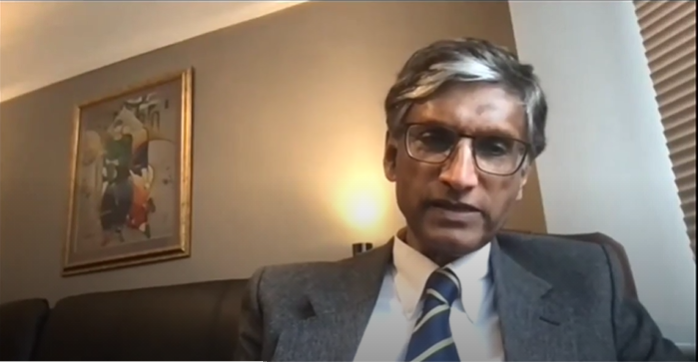KEY figures from across the Liverpool City Region have met to discuss how to rebuild and thrive following the Covid-19 pandemic.
Liverpool Hope University’s Vice Chancellor and Rector Professor Gerald Pillay was one of the guest speakers at the online event, which was watched by an audience of more than 400 viewers.
It was chaired by Professor Michael Parkinson, Honorary Professor at the University of Liverpool and Ambassador for its Heseltine Institute for Public Policy, Practice and Place.
Other invited speakers included the Archbishop of Liverpool Malcolm McMahon, Everton Football Club Chief Executive Denise Barrett-Baxendale and Liverpool City Council Chief Executive Tony Reeves.
Outlining what the webinar, held in conjunction with the Metropolitan and Liverpool Cathedrals, aimed to achieve, Prof. Parkinson said: “None of us remain unaffected by this pandemic, personally or professionally. We all struggle with huge material, emotional and psychological pressures, especially those who, for almost a year now, have been on the various front lines of this crisis.
“We’re all trying to make sense of this tragedy, and what it means to our individual and collective futures.
“We want to broaden this debate beyond the economic issues to wider social, health and institutional issues, and indeed the underlying moral, spiritual existential issues.
“What kind of life will we have after Covid? What has the pandemic done to relationships and connections individually and institutionally? Why is working together across the City Region so important now, and how can we do it better in the future? And what contribution can the churches, as crucial partners, make to the process?”
Professor Pillay outlined why there can be no place for ‘self interest’ or ‘greed’ in a post-pandemic landscape.
And he also stressed the importance of making sure there are no barriers to children from poorer backgrounds who want to pursue higher education.

In a moving speech, he said: “As long as the gap between the rich minority and the poor majority increases, then both rich and poor are in trouble.”
He added: “Covid, surely, has providentially taught us that we need to reorder our values and priorities.
“The poor don’t need handouts so they can stay in a constant state of dependency, the poor need a hand up, to take their place in society and to be involved in the dignity of work.
“And for me the big hand up is education. You’d expect me to say that. But I’m not saying that as a Vice Chancellor, I’m saying it because I grew up in South Africa under Apartheid. Not being white, I didn’t vote for the first time until I was in my 40s.
“I was there when the children of Soweto went on the march, and led the nation in the liberation struggle. Their slogan was, ‘Liberation Now, Education Later’.
“My father said to me ‘Son, education is liberation. Apply yourself to get the best possible education you can’.
“And that’s my message to our city and to the children who live here.”
Archbishop Malcolm McMahon discussed the perils of social exclusion - and how we can work to remove those divisions.
Meanwhile Everton FC’s Denise Barrett-Baxendale urged organisations and institutions not to put ‘people ahead of profit’, while also saying society needed to address ‘educational and health-based inequalities which have been highlighted through the pandemic, both locally and nationally.’
She spoke of the ‘devastation of isolation’, but also how communities had come together to support each other.
In a message of Hope, she revealed: “What do I want after Covid? I want leaders to continue to feel proud of how we’ve performed throughout this period. I, at Everton, have never been prouder of my staff and of our community. We have responded accordingly.”
She also spoke about working in line with the ‘Papal Vision’, ‘around compassion, respect, love, enlightenment, balance - which I think a lot of us lost sight of - and most importantly, joy’.
And meeting Chair Prof. Parkinson also expressed optimism for the future.
Discussing the importance of the various relationships between institutions in the Liverpool City Region, he stated: “We will need to build upon and draw upon that partnership as we emerge from this pandemic.
“We should do it with realism, but also with confidence given what our city has achieved in the last 10 years, and given the fortitude, innovation and leadership we’ve had during the crisis.”
** You can watch the debate for yourself by heading here and scrolling down to the section titled, ‘Liverpool Responds: Who Cares? What kind of life after COVID-19?’



